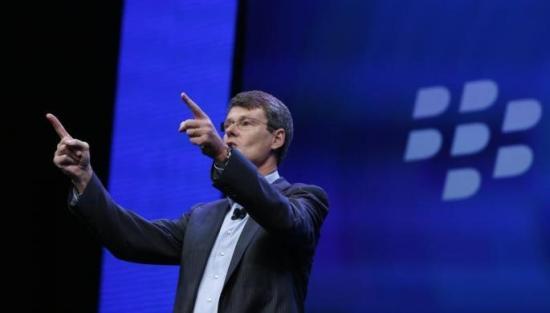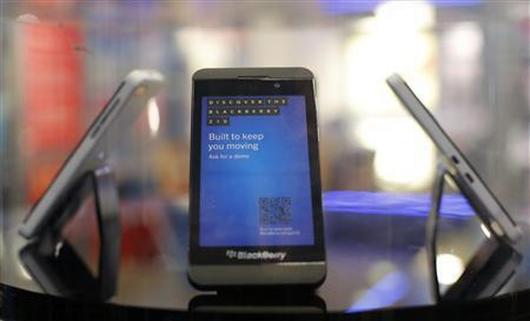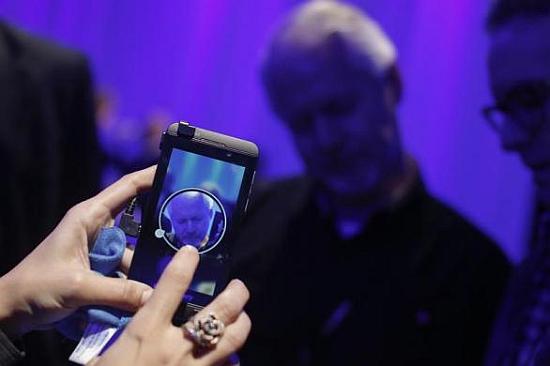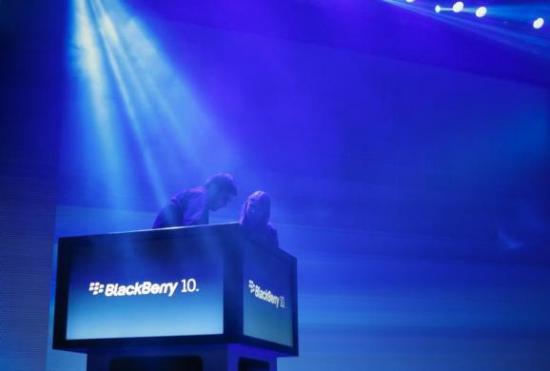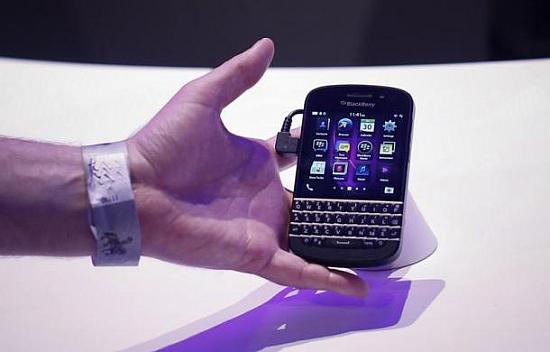 | « Back to article | Print this article |
BlackBerry eyes future beyond its new line of devices
Barely a week after launching an all-new, make-or-break line of smartphones, BlackBerry is already looking at a future in which it is a leader in "mobile computing," chief executive Thorsten Heins said on Tuesday.
Heins said BlackBerry is aiming to reclaim its spot as an innovator in a world where smartphones already have the processing power to replace tablets and laptops.
The company, which changed its name from Research In Motion when it launched its new BlackBerry 10 smartphones a week ago, pioneered on-the-go email before losing ground to nimbler rivals with faster devices. It is now out to explore new territory.
"This isn't just about smartphones and tablets," Heins, who took over as CEO just over a year ago, said in an interview soon after the launch of the BlackBerry 10 devices.
"The architecture we have built is true mobile computing architecture. It's not a downgraded PC operating system. It is a whole new innovation built from scratch. It's built for mobile."
While speaking at the Empire Club of Canada on Tuesday, Heins reiterated his message: "BlackBerry 10 is not just a device. It is a whole new mobile computing platform," he said.
Click NEXT to read more...
BlackBerry eyes future beyond its new line of devices
Despite a number of glowing reviews for the BB10 and reports of strong initial sales, however, some analysts and technology pundits are skeptical about BlackBerry's chances of mounting a comeback, doubting its ability to sell either enough smartphones or manage to transform the way people work.
"The Street cares about how many units of these (devices) they're going to sell and that is the balancing act," said John Jackson, an industry analyst at consulting firm IDC.
Jackson said he can see a future in which the BlackBerry 10 operating system will allow users to control a vast array of devices, but added: "They need to sell devices to keep the lights on while they transform themselves into a next-generation computing platform."
BlackBerry's marketing head, Frank Boulben, said the company is moving quickly enough to do just that.
"The vision is going to start to materialize this year," he said. "You will be able to plug the (Z10) device into a docking station at the office and then all you need is a keyboard, a mouse and a screen. Combined with cloud services this would mean you don't need a laptop or a desktop."
Click NEXT to read more...
BlackBerry eyes future beyond its new line of devices
BlackBerry last week unveiled two versions of devices that run on the BB10 OS, a touchscreen smartphone dubbed Z10 and one with a physical keyboard called the Q10, betting they will help it win back some of the market share it has bled to the likes of Apple and Samsung Electronics.
It's About The Platform
On launch day, Heins spent the first 20 minutes of the event talking about the BlackBerry 10 platform, rather than about the new smartphone models themselves.
"Over the short term, yes, we have to be successful with the devices, we have got to win back the enterprises, we've got win back consumers," he said. "But in the longer term, we have to understand where this company is going."
Initial checks from analysts point to strong sales for the Z10 in its early launch countries of Canada and Britain. The Q10 device will not be on sale until April.
"We spoke to a range of U.K. vendors over the weekend who indicated BlackBerry's Z10 sales were strong," Barclays analyst Jeff Kvaal said in a note. "Some store locations were completely sold out of the Z10 device, while others had limited stock."
Click NEXT to read more...
BlackBerry eyes future beyond its new line of devices
Two of Canada's largest wireless carriers, Rogers and Bell, say demand for the new devices is strong.
Rogers said pre-orders for the Z10 device are already in the thousands, while Bell said customer pre-registration numbers for the new smartphone are unprecedented for a new BlackBerry device.
Analyst upgrades, coupled with the Z10 sales reports, have sparked a surge in BlackBerry's shares this week. The stock is up more than 24 percent from Friday's close of $13.03 on the Nasdaq.
The stock, which remains some 90 percent below its 2008 peak, fell more than 20 percent in the two days following the BlackBerry launch, partly on disappointment that the new devices will not hit the crucial U.S. market until next month.
All Options Open
At the launch, BlackBerry did not address its so far unsuccessful foray into the tablet market, but Heins said the company remains committed to this segment.
"I'm not getting out of the tablet business, I've asked my teams to build another one, but I need to make money from it. If the hardware doesn't provide the margins I need, then it makes no sense in doing it," he said.
Click NEXT to read more...
BlackBerry eyes future beyond its new line of devices
BlackBerry's PlayBook tablets debuted in 2011, but never gained traction against Apple's iPad and other devices. The company was forced to write down the value of the devices and it has since sold them at sharply reduced prices.
Heins said BlackBerry will remain focused on expanding its business in mobile computing over the next two to four years.
BlackBerry's QNX operating system, which forms the basis of its new BlackBerry 10 OS, already runs cars, nuclear reactors and manufacturing plants, and Heins said this opens new vistas for the company, although he gave no clear description of what they are.
"What we need to decide is where do we play? It could be a software play, a licensing play, an end-to-end horizontal play, we'll figure that out," he said. "In five years, yes we might still be in hardware, but we may not be in hardware ... I'm not ruling anything out."
"Mobile computing is not going to be decided in the next quarter ... We have got to figure out as an industry how we get there. All I know is that I want us to be a leader there."

© Copyright 2025 Reuters Limited. All rights reserved. Republication or redistribution of Reuters content, including by framing or similar means, is expressly prohibited without the prior written consent of Reuters. Reuters shall not be liable for any errors or delays in the content, or for any actions taken in reliance thereon.
